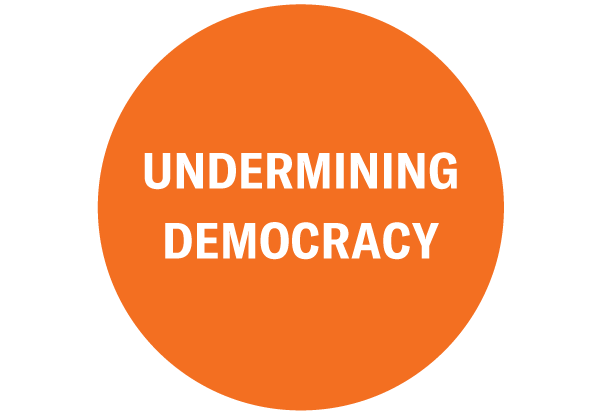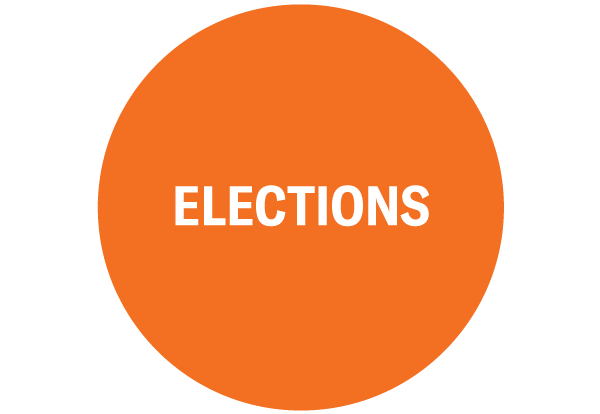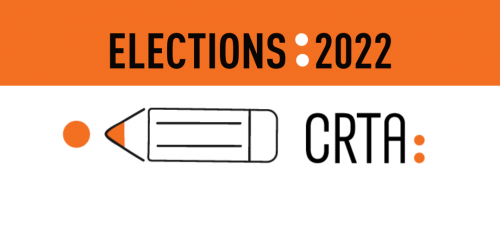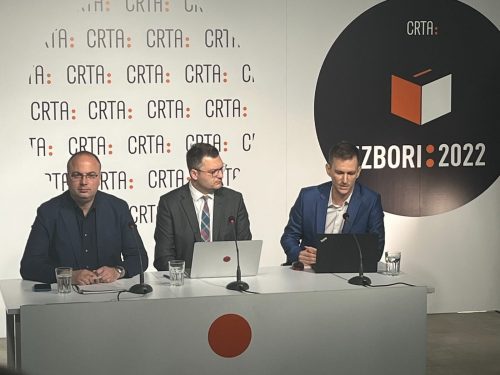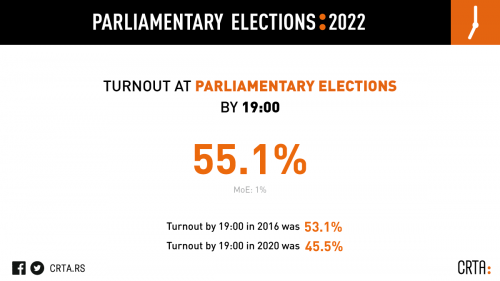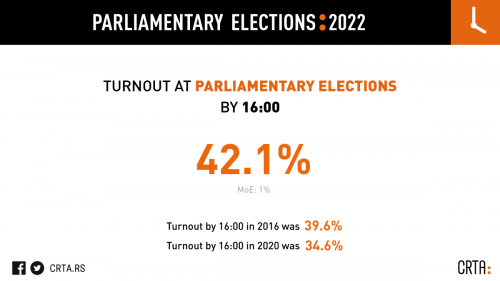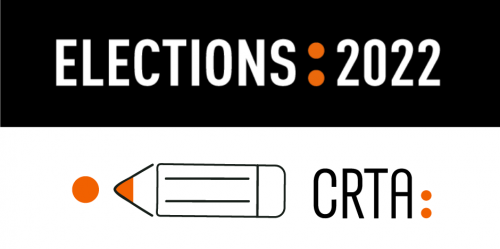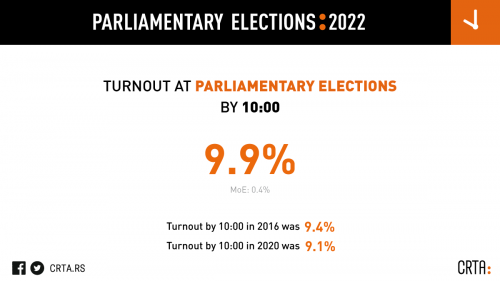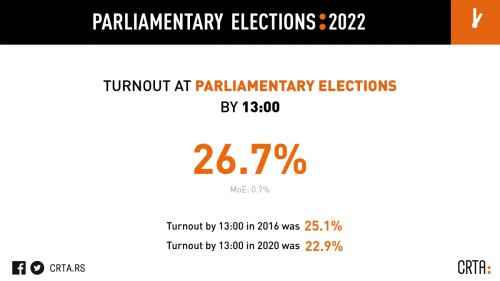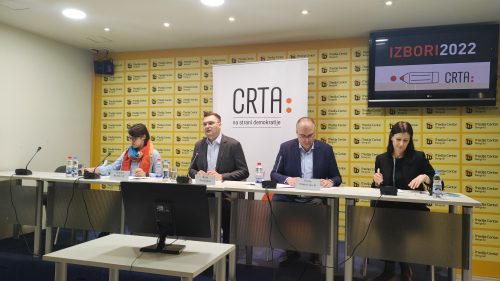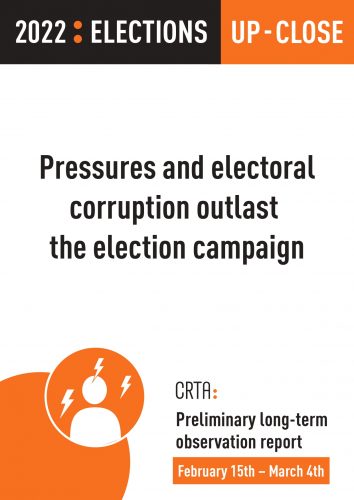On the basis of processed data from 99 percent of polling stations, voter turnout in presidential elections elections is 58,6 percent (margin of error 1 percent). On the basis of processed data from 99 percent of polling stations, voter turnout in parliamentary elections elections is 58,7 percent (margin of error 1 percent). …
Election day went in an atmosphere full of tensions that on several occasions escalated into physical violence, manifesting the unpreparedness of election administration and the lack of citizens’ trust in institutions. Extremely poor organization of the voting process and tensions on the election day were the expected outcome of the continuous degradation of the integrity of the electoral process in its entirety, which was marked by strengthening and sophistication of mechanisms of electoral corruption, and endangerment of citizens’ voting rights.
A total of 55,1 percent of citizens voted in the presidential elections by 19:00 (margin of error 1 percent). In comparison, voter turnout by 19:00 in the 2016 parliamentary elections amounted to 53,1 percent, and 45,5 percent in 2020. On the territory of Belgrade, voter turnout by 19:00 in parliamentary elections is 52,2 (margin of error 0,6 percent), which is 4 percent points higher than in the 2018 Belgrade elections.
A total of 42,1 percent of voters registered in the Voters’ List voted in parliamentary elections by 16:00 (margin of error 1 percent). In comparison, voter turnout by 16:00 in the 2016 parliamentary elections was 39,6 percent, and 34,6 percent in the 2020 elections. On the territory of Belgrade, voter turnout in parliamentary elections is slightly lower than in the rest of Serbia, amounting to 37,9 percent (margin of error 0,7 percent).
In the first half of the election day only, CRTA’s observers recorded several cases of physical and verbal violence at and in the vicinity of polling stations, while other violent incidents were reported as well.
A total of 9,9 percent of voters registered in the Voters’ List voted in parliamentary elections by 10:00 (margin of error 0,4). In comparison, voter turnout by 10:00 in the 2016 parliamentary elections was 9,4 percent, and 9,1 percent in the 2020 parliamentary elections.
A total of 26,7 percent of voters voted in parliamentary elections by 13:00 (margin of error 0,7). In comparison, voter turnout by 13:00 in the 2016 parliamentary and 2017 presidential elections was 25,1 percent, and 22,9 percent in the 2020 elections.
Institutions responsible for implementing laws and protecting voter rights did not, through their work, sufficiently contribute to protecting the public interest and achieving a higher degree of standards for free and democratic elections. Those institutions that did react to law breaches during the campaign did not influence a change in behaviour of those electoral actors who abused their institutional advantages in the election campaign.
Citizens from socially vulnerable categories, as well as public sector employees, are daily and continuously pressured to give their support or enforce support among other people for a political party. This is one of the main findings of the CRTA Observation Mission during the first part of the election campaign. Findings also show that, although…
Our topics

Democratic culture
Because politics is not just for politicians. It is our human and citizen right to participate in the processes of making decisions which influence our lives. A dialogue has no alternative.

Free and fair elections
Because elections are the pillars of democracy. It is every citizen’s right to decide on whom to give his/her vote in free and fair conditions. Our vote is valuable and it can make a difference.

Open institutions
Because institutions serve the citizens. We need strong institutions with integrity which protect the public interest.
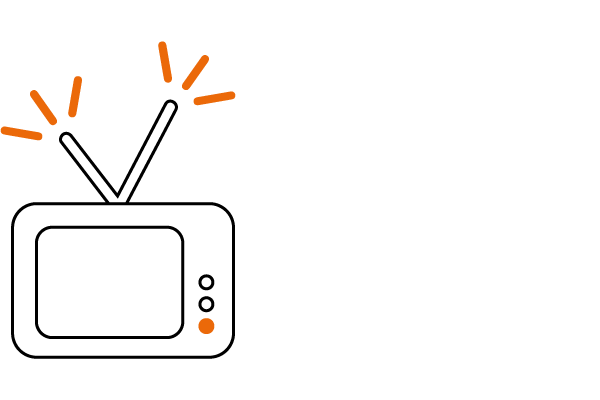
Free media
Because media should ask questions and critically analyse the reality. We need the media which protect the public interest and tackle the needs of the citizens.




